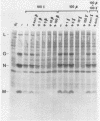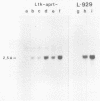Abstract
We showed previously that the mouse fibroblastoid cell line Ltk-aprt- is resistant to the antiviral effects of beta interferon. This lack of response reflects a partial sensitivity to the interferon that is accompanied by a failure to activate expression of several interferon-regulated genes, although certain other genes respond in a normal manner. We show here that Ltk-aprt- cells were also unable to establish an antiviral state and to activate expression of 2,5-oligo(A) synthetase when treated with gamma interferon. Strikingly, however, treatment with a combination of beta interferon and gamma interferon provided complete protection against viral replication. Although the cells were completely insensitive to up to 250 U of the interferons per ml added singly, essentially complete protection from viral cytopathic effects was achieved when as little as 10 U of each of the interferons per ml were combined. Expression of 2,5-oligo(A) synthetase was also sensitive to this synergistic effect. Activation of an antiviral state could also be achieved by sequential treatment, first with gamma interferon and then with beta interferon. Partial protection against viral replication could be achieved by pretreatment with gamma interferon for as little as 1 h before incubation with beta interferon and could be blocked by the addition of specific antibodies or by cycloheximide, indicating that gamma interferon induces the synthesis of a protein which can act synergistically with a signal produced by the beta-interferon receptor. We suggest that Ltk-aprt- cells suffer from defects in one or more components of the gene activation pathways for both type I and type II interferons. Nonetheless, gamma interferon is able to activate the expression of a gene encoding a protein required for signal transduction. This protein acts synergistically with a transient signal produced in response to beta interferon, thereby activating the expression of a further group of genes.
Full text
PDF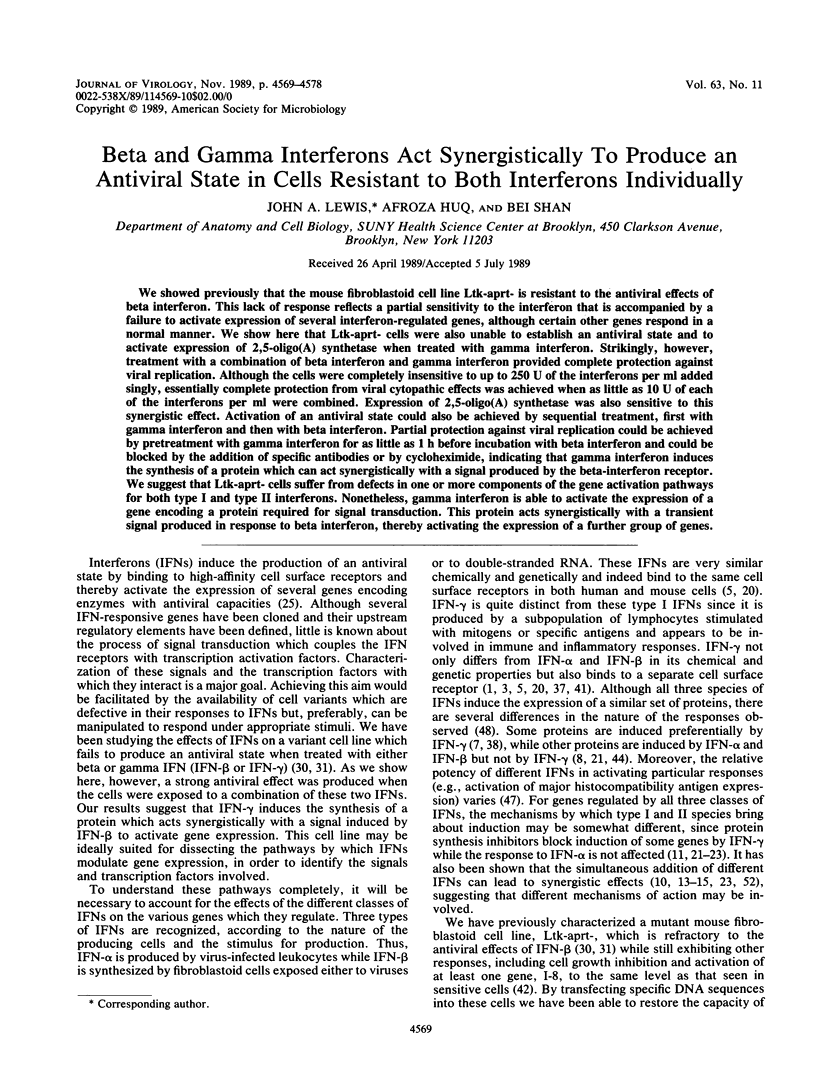
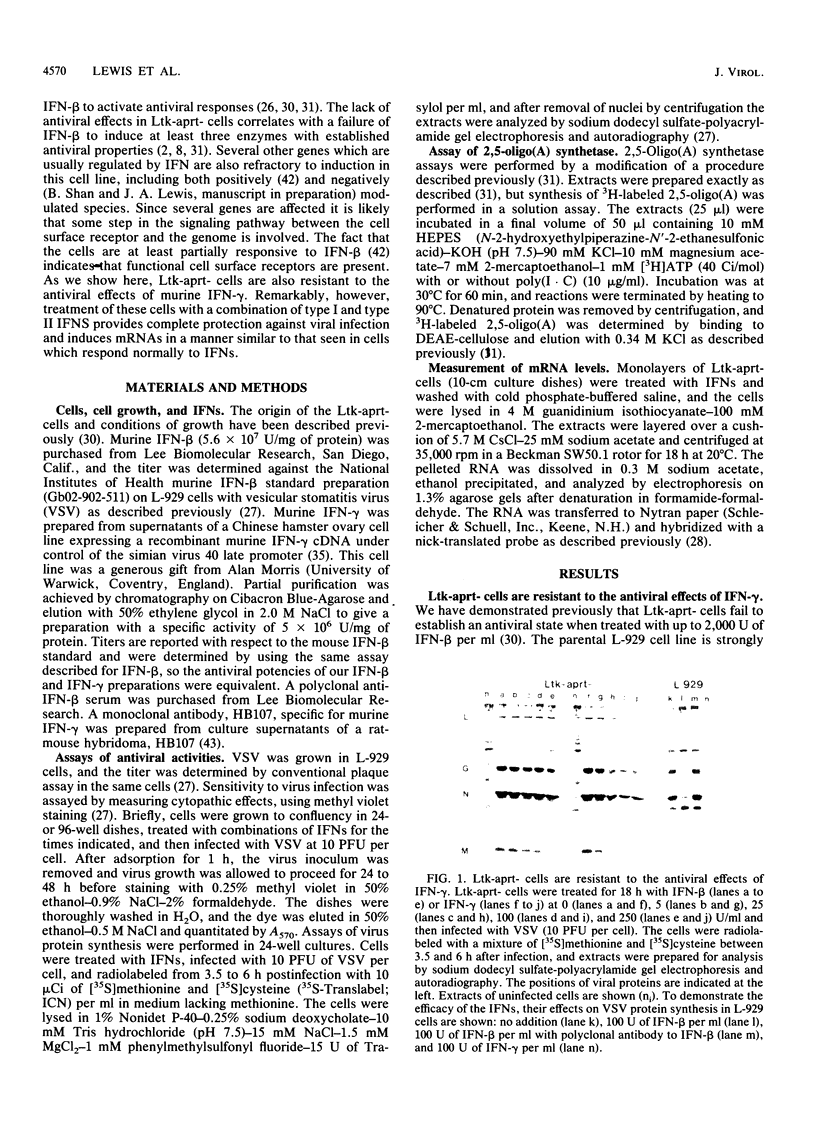
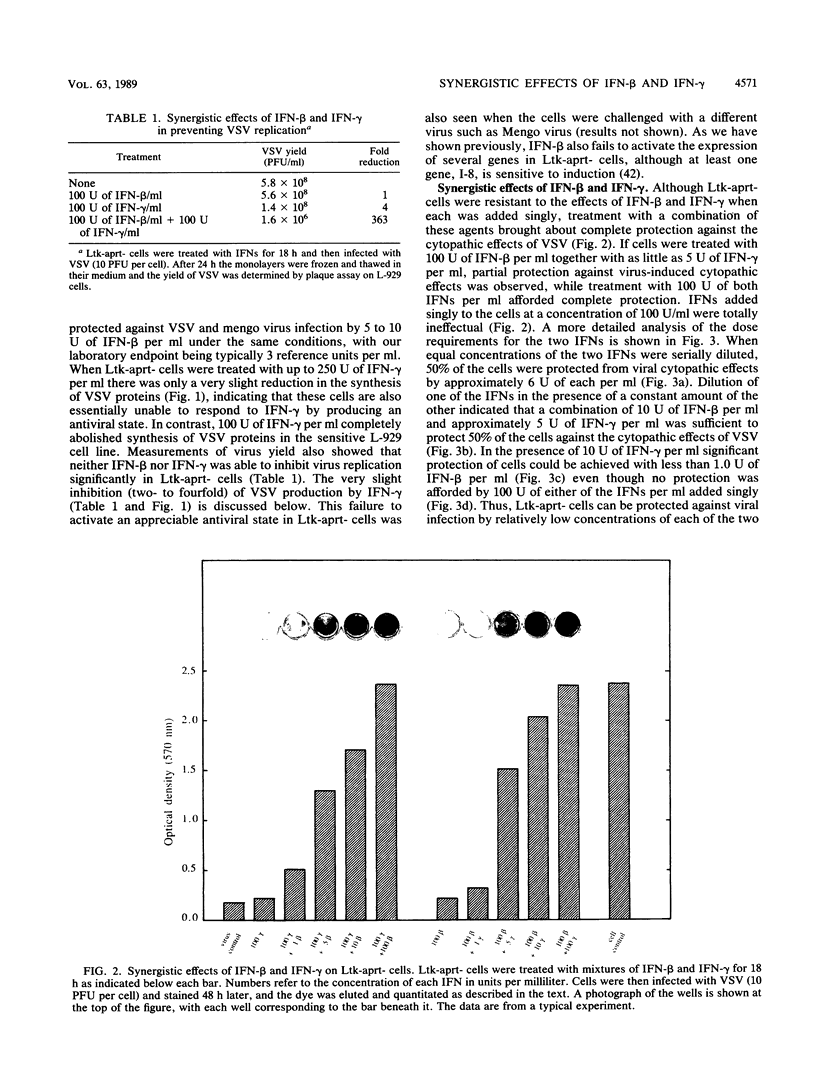
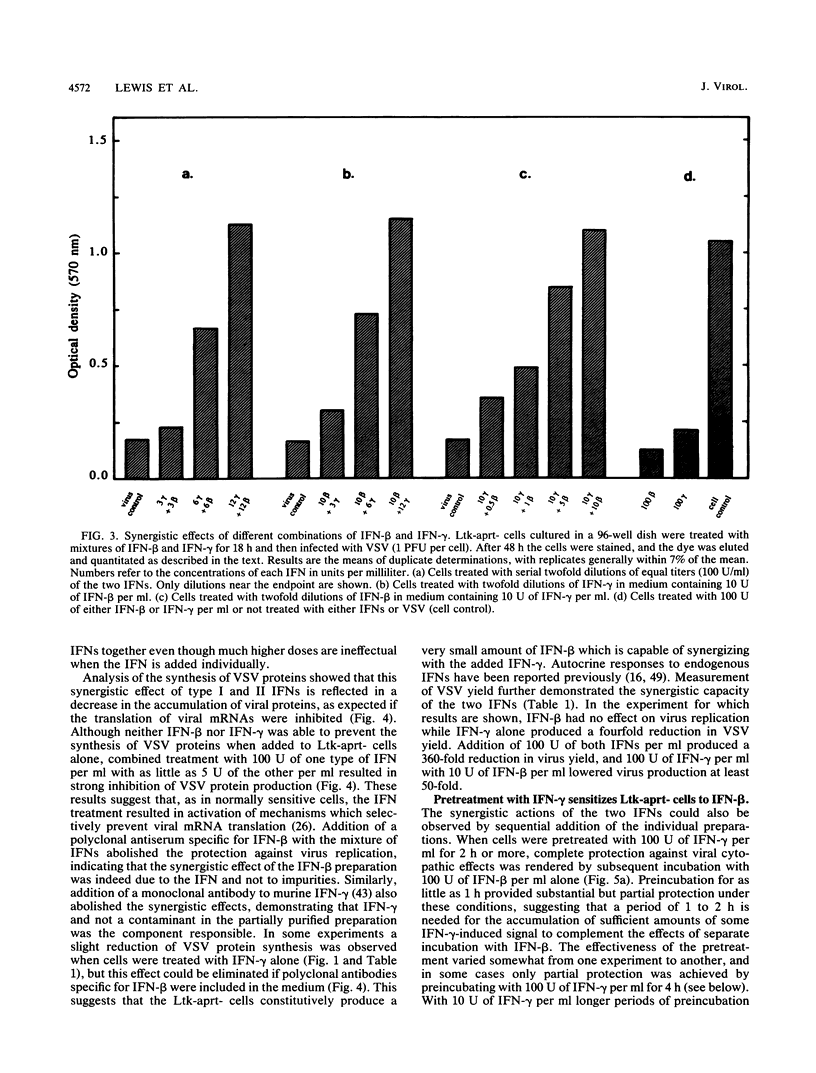
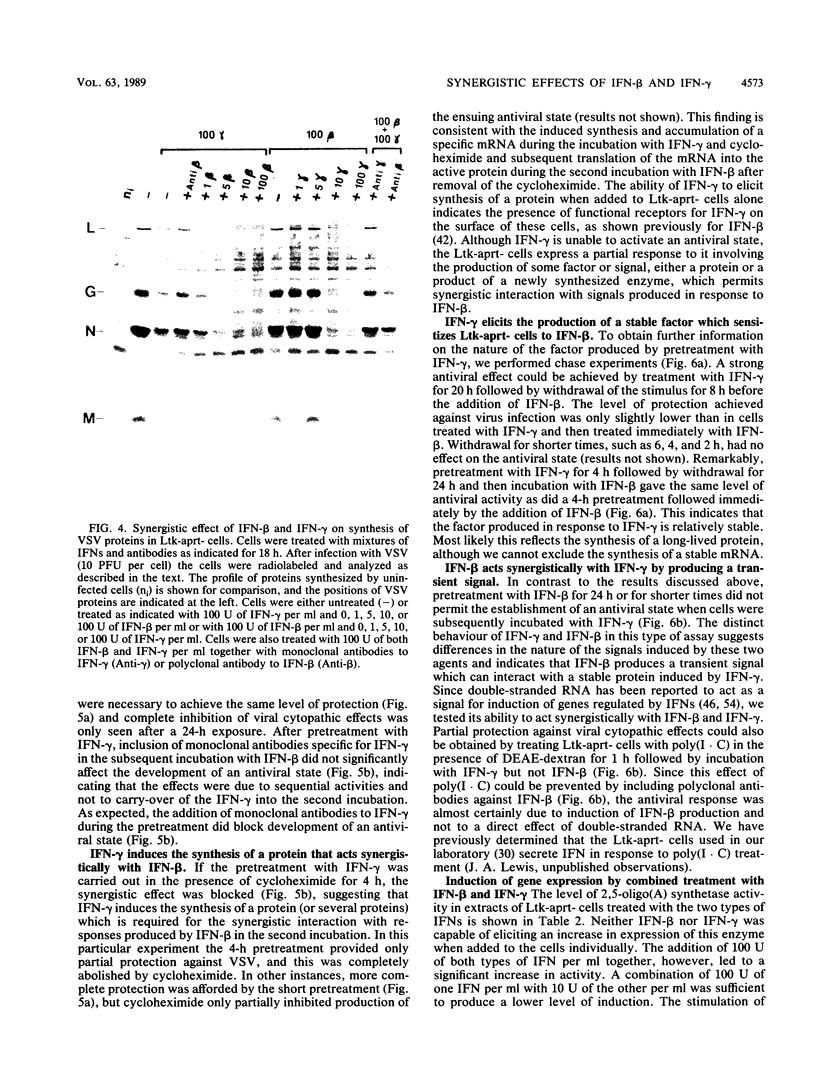
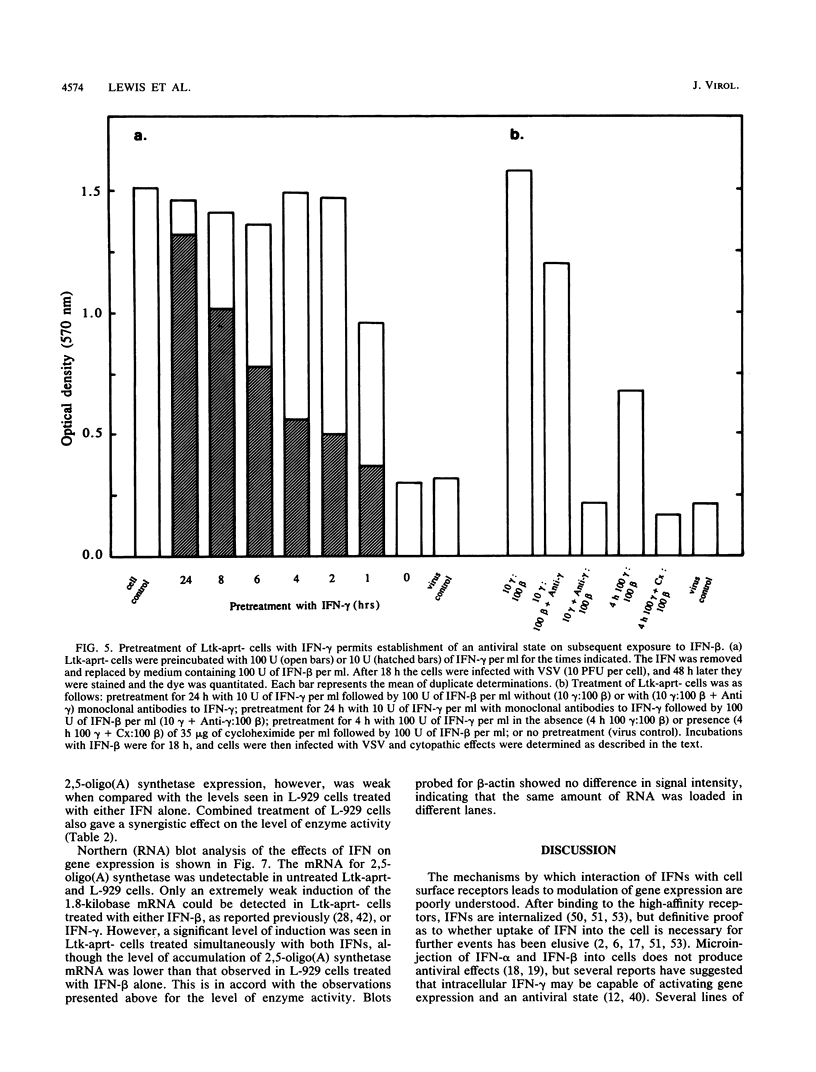
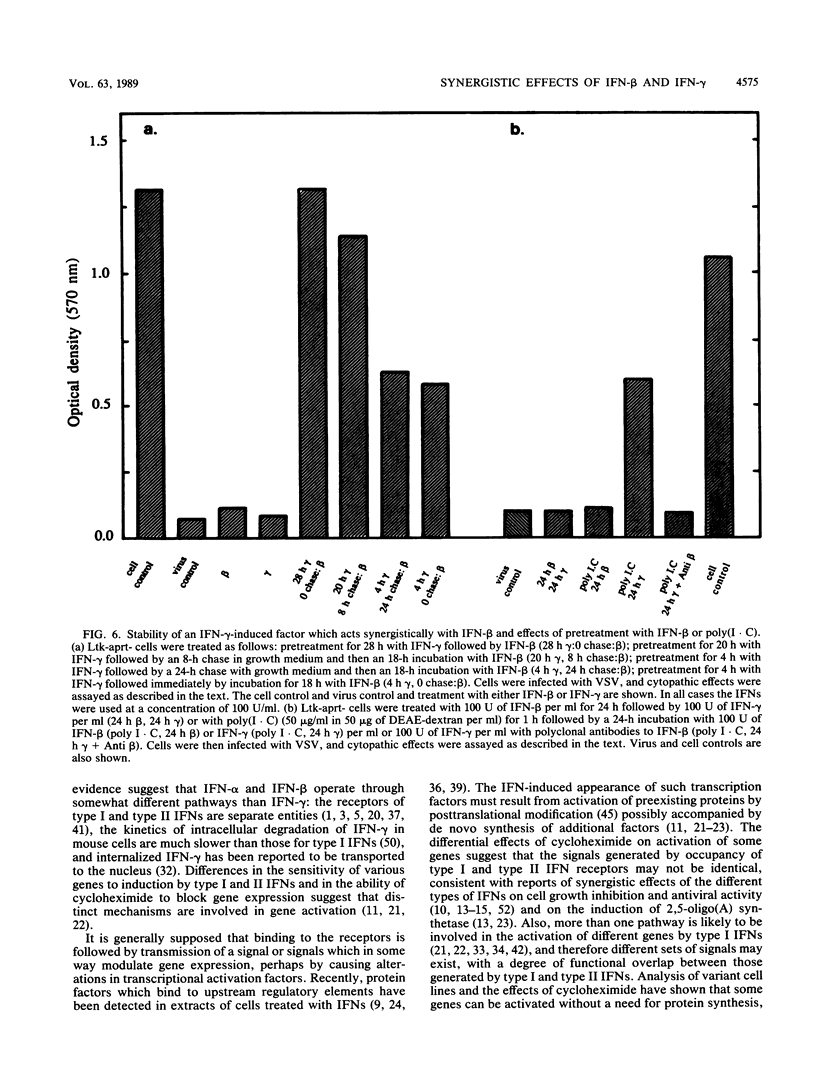
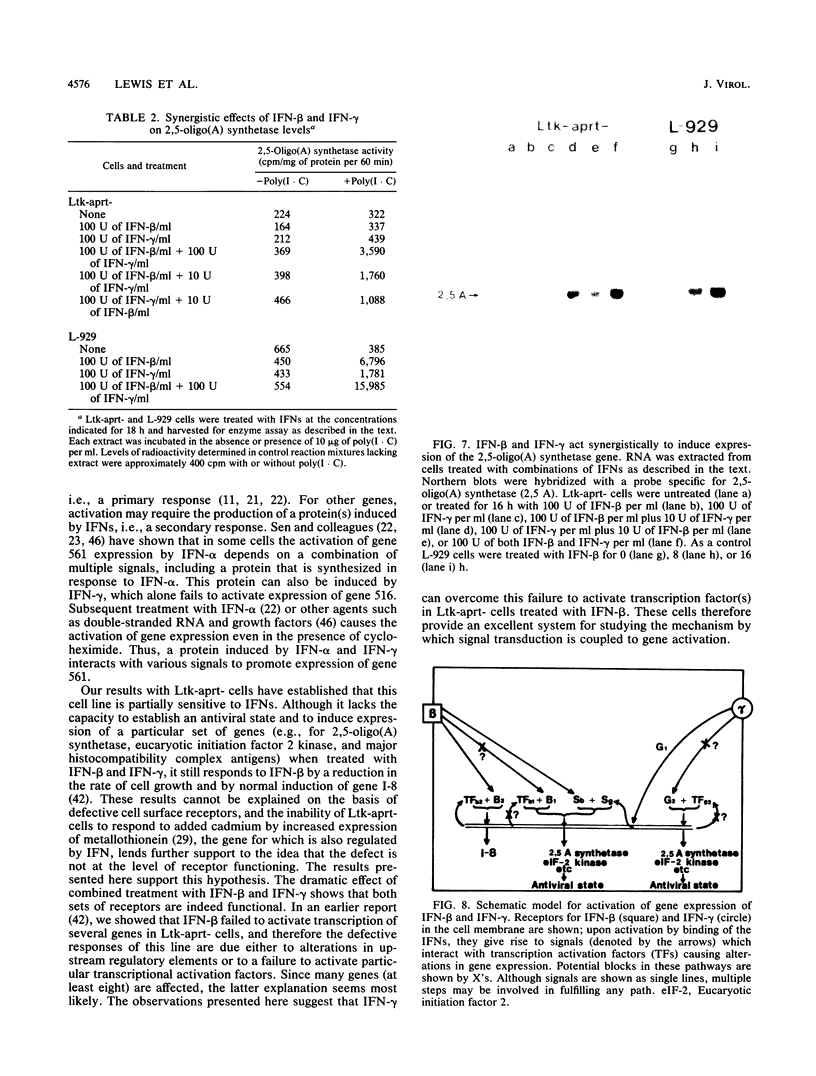
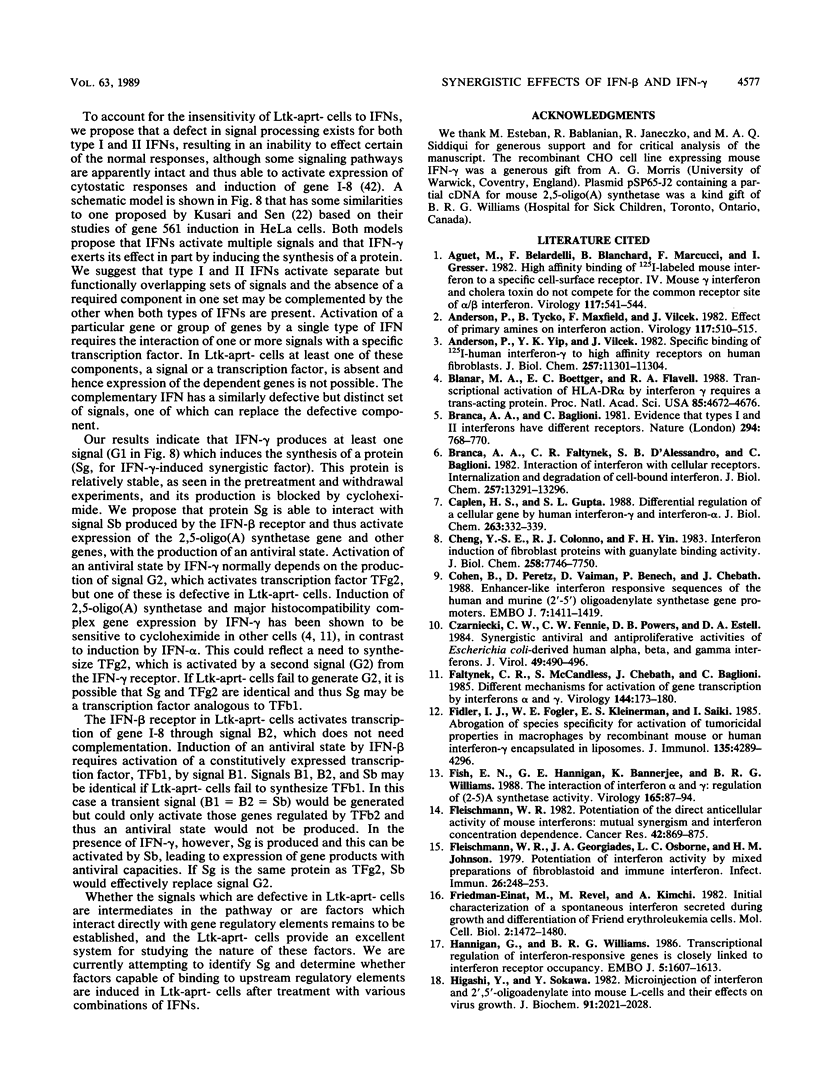
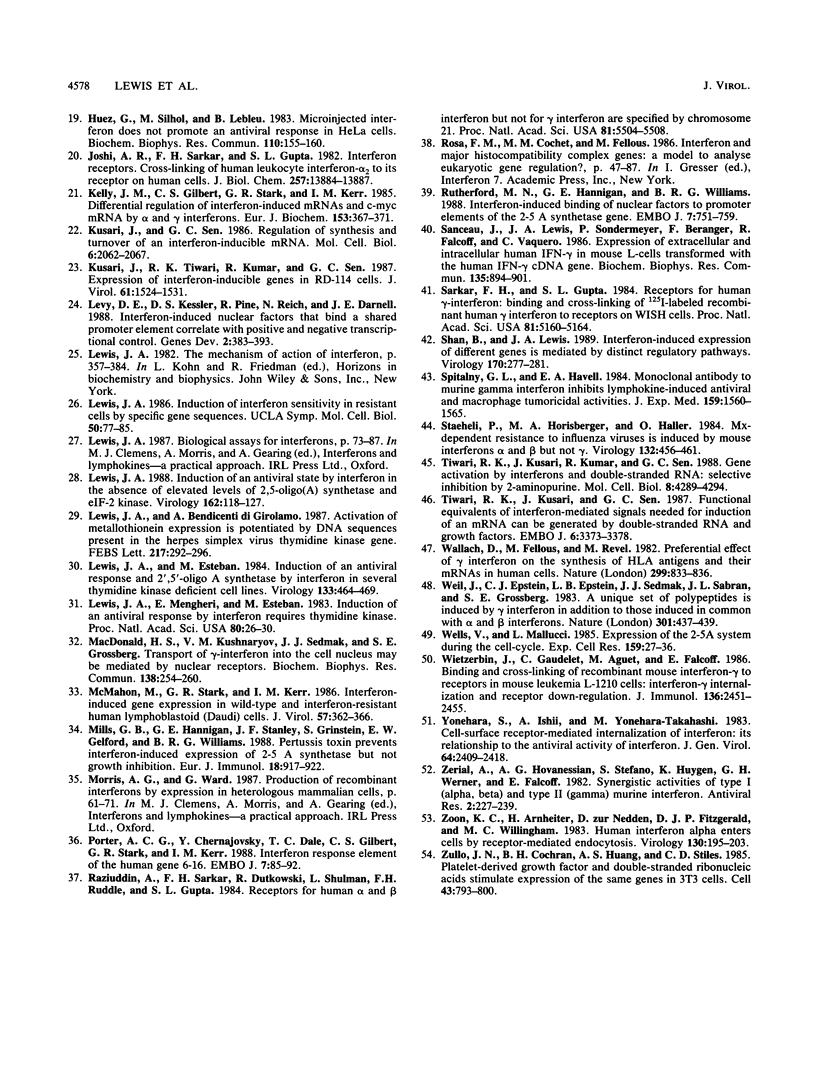
Images in this article
Selected References
These references are in PubMed. This may not be the complete list of references from this article.
- Aguet M., Belardelli F., Blanchard B., Marcucci F., Gresser I. High-affinity binding of 125I-labeled mouse interferon to a specific cell surface receptor. IV. Mouse gamma interferon and cholera toxin do not compete for the common receptor site of alpha / beta interferon. Virology. 1982 Mar;117(2):541–544. doi: 10.1016/0042-6822(82)90497-4. [DOI] [PubMed] [Google Scholar]
- Anderson P., Tycko B., Maxfield F., Vilcek J. Effect of primary amines on interferon action. Virology. 1982 Mar;117(2):510–515. doi: 10.1016/0042-6822(82)90491-3. [DOI] [PubMed] [Google Scholar]
- Anderson P., Yip Y. K., Vilcek J. Specific binding of 125I-human interferon-gamma to high affinity receptors on human fibroblasts. J Biol Chem. 1982 Oct 10;257(19):11301–11304. [PubMed] [Google Scholar]
- Blanar M. A., Boettger E. C., Flavell R. A. Transcriptional activation of HLA-DR alpha by interferon gamma requires a trans-acting protein. Proc Natl Acad Sci U S A. 1988 Jul;85(13):4672–4676. doi: 10.1073/pnas.85.13.4672. [DOI] [PMC free article] [PubMed] [Google Scholar]
- Branca A. A., Baglioni C. Evidence that types I and II interferons have different receptors. Nature. 1981 Dec 24;294(5843):768–770. doi: 10.1038/294768a0. [DOI] [PubMed] [Google Scholar]
- Branca A. A., Faltynek C. R., D'Alessandro S. B., Baglioni C. Interaction of interferon with cellular receptors. Internalization and degradation of cell-bound interferon. J Biol Chem. 1982 Nov 25;257(22):13291–13296. [PubMed] [Google Scholar]
- Caplen H. S., Gupta S. L. Differential regulation of a cellular gene by human interferon-gamma and interferon-alpha. J Biol Chem. 1988 Jan 5;263(1):332–339. [PubMed] [Google Scholar]
- Cheng Y. S., Colonno R. J., Yin F. H. Interferon induction of fibroblast proteins with guanylate binding activity. J Biol Chem. 1983 Jun 25;258(12):7746–7750. [PubMed] [Google Scholar]
- Cohen B., Peretz D., Vaiman D., Benech P., Chebath J. Enhancer-like interferon responsive sequences of the human and murine (2'-5') oligoadenylate synthetase gene promoters. EMBO J. 1988 May;7(5):1411–1419. doi: 10.1002/j.1460-2075.1988.tb02958.x. [DOI] [PMC free article] [PubMed] [Google Scholar]
- Czarniecki C. W., Fennie C. W., Powers D. B., Estell D. A. Synergistic antiviral and antiproliferative activities of Escherichia coli-derived human alpha, beta, and gamma interferons. J Virol. 1984 Feb;49(2):490–496. doi: 10.1128/jvi.49.2.490-496.1984. [DOI] [PMC free article] [PubMed] [Google Scholar]
- Faltynek C. R., McCandless S., Chebath J., Baglioni C. Different mechanisms for activation of gene transcription by interferons alpha and gamma. Virology. 1985 Jul 15;144(1):173–180. doi: 10.1016/0042-6822(85)90315-0. [DOI] [PubMed] [Google Scholar]
- Fidler I. J., Fogler W. E., Kleinerman E. S., Saiki I. Abrogation of species specificity for activation of tumoricidal properties in macrophages by recombinant mouse or human interferon-gamma encapsulated in liposomes. J Immunol. 1985 Dec;135(6):4289–4296. [PubMed] [Google Scholar]
- Fish E. N., Hannigan G. E., Banerjee K., Williams B. R. The interaction of interferon-alpha and -gamma: regulation of (2-5)A synthetase activity. Virology. 1988 Jul;165(1):87–94. doi: 10.1016/0042-6822(88)90661-7. [DOI] [PubMed] [Google Scholar]
- Fleischmann W. R., Jr, Georgiades J. A., Osborne L. C., Johnson H. M. Potentiation of interferon activity by mixed preparations of fibroblast and immune interferon. Infect Immun. 1979 Oct;26(1):248–253. doi: 10.1128/iai.26.1.248-253.1979. [DOI] [PMC free article] [PubMed] [Google Scholar]
- Fleischmann W. R., Jr Potentiation of the direct anticellular activity of mouse interferons: mutual synergism and interferon concentration dependence. Cancer Res. 1982 Mar;42(3):869–875. [PubMed] [Google Scholar]
- Gelfand E. W., Cheung R. K., Mills G. B., Grinstein S. Uptake of extracellular Ca2+ and not recruitment from internal stores is essential for T lymphocyte proliferation. Eur J Immunol. 1988 Jun;18(6):917–922. doi: 10.1002/eji.1830180613. [DOI] [PubMed] [Google Scholar]
- Hannigan G., Williams B. R. Transcriptional regulation of interferon-responsive genes is closely linked to interferon receptor occupancy. EMBO J. 1986 Jul;5(7):1607–1613. doi: 10.1002/j.1460-2075.1986.tb04403.x. [DOI] [PMC free article] [PubMed] [Google Scholar]
- Higashi Y., Sokawa Y. Microinjection of interferon and 2',5'-oligoadenylate into mouse L cells and their effects on virus growth. J Biochem. 1982 Jun;91(6):2021–2028. doi: 10.1093/oxfordjournals.jbchem.a133895. [DOI] [PubMed] [Google Scholar]
- Huez G., Silhol M., Lebleu B. Microinjected interferon does not promote an antiviral response in Hela cells. Biochem Biophys Res Commun. 1983 Jan 14;110(1):155–160. doi: 10.1016/0006-291x(83)91273-1. [DOI] [PubMed] [Google Scholar]
- Joshi A. R., Sarkar F. H., Gupta S. L. Interferon receptors. Cross-linking of human leukocyte interferon alpha-2 to its receptor on human cells. J Biol Chem. 1982 Dec 10;257(23):13884–13887. [PubMed] [Google Scholar]
- Kelly J. M., Gilbert C. S., Stark G. R., Kerr I. M. Differential regulation of interferon-induced mRNAs and c-myc mRNA by alpha- and gamma-interferons. Eur J Biochem. 1985 Dec 2;153(2):367–371. doi: 10.1111/j.1432-1033.1985.tb09312.x. [DOI] [PubMed] [Google Scholar]
- Kusari J., Sen G. C. Regulation of synthesis and turnover of an interferon-inducible mRNA. Mol Cell Biol. 1986 Jun;6(6):2062–2067. doi: 10.1128/mcb.6.6.2062. [DOI] [PMC free article] [PubMed] [Google Scholar]
- Kusari J., Tiwari R. K., Kumar R., Sen G. C. Expression of interferon-inducible genes in RD-114 cells. J Virol. 1987 May;61(5):1524–1531. doi: 10.1128/jvi.61.5.1524-1531.1987. [DOI] [PMC free article] [PubMed] [Google Scholar]
- Levy D. E., Kessler D. S., Pine R., Reich N., Darnell J. E., Jr Interferon-induced nuclear factors that bind a shared promoter element correlate with positive and negative transcriptional control. Genes Dev. 1988 Apr;2(4):383–393. doi: 10.1101/gad.2.4.383. [DOI] [PubMed] [Google Scholar]
- Lewis J. A., Bendicenti di Girolamo A. Activation of metallothionein expression is potentiated by DNA sequences present in the herpes simplex virus thymidine kinase gene. FEBS Lett. 1987 Jun 15;217(2):292–296. doi: 10.1016/0014-5793(87)80681-6. [DOI] [PubMed] [Google Scholar]
- Lewis J. A., Esteban M. Induction of an anti-viral response and 2',5'-oligo A synthetase by interferon in several thymidine kinase-deficient cell lines. Virology. 1984 Mar;133(2):464–469. doi: 10.1016/0042-6822(84)90415-x. [DOI] [PubMed] [Google Scholar]
- Lewis J. A. Induction of an antiviral state by interferon in the absence of elevated levels of 2,5-oligo(A) synthetase and eIF-2 kinase. Virology. 1988 Jan;162(1):118–127. doi: 10.1016/0042-6822(88)90400-x. [DOI] [PubMed] [Google Scholar]
- Lewis J. A., Mengheri E., Esteban M. Induction of an antiviral response by interferon requires thymidine kinase. Proc Natl Acad Sci U S A. 1983 Jan;80(1):26–30. doi: 10.1073/pnas.80.1.26. [DOI] [PMC free article] [PubMed] [Google Scholar]
- Lewis J. A. The mechanism of action of interferon. Horiz Biochem Biophys. 1982;6:357–384. [PubMed] [Google Scholar]
- McMahon M., Stark G. R., Kerr I. M. Interferon-induced gene expression in wild-type and interferon-resistant human lymphoblastoid (Daudi) cells. J Virol. 1986 Jan;57(1):362–366. doi: 10.1128/jvi.57.1.362-366.1986. [DOI] [PMC free article] [PubMed] [Google Scholar]
- Porter A. C., Chernajovsky Y., Dale T. C., Gilbert C. S., Stark G. R., Kerr I. M. Interferon response element of the human gene 6-16. EMBO J. 1988 Jan;7(1):85–92. doi: 10.1002/j.1460-2075.1988.tb02786.x. [DOI] [PMC free article] [PubMed] [Google Scholar]
- Raziuddin A., Sarkar F. H., Dutkowski R., Shulman L., Ruddle F. H., Gupta S. L. Receptors for human alpha and beta interferon but not for gamma interferon are specified by human chromosome 21. Proc Natl Acad Sci U S A. 1984 Sep;81(17):5504–5508. doi: 10.1073/pnas.81.17.5504. [DOI] [PMC free article] [PubMed] [Google Scholar]
- Revel M. F., Kimchi A. Initial characterization of a spontaneous interferon secreted during growth and differentiation of Friend erythroleukemia cells. Mol Cell Biol. 1982 Dec;2(12):1472–1480. doi: 10.1128/mcb.2.12.1472. [DOI] [PMC free article] [PubMed] [Google Scholar]
- Rosa F. M., Cochet M. M., Fellous M. Interferon and major histocompatibility complex genes: a model to analyse eukaryotic gene regulation? Interferon. 1986;7:47–87. [PubMed] [Google Scholar]
- Rutherford M. N., Hannigan G. E., Williams B. R. Interferon-induced binding of nuclear factors to promoter elements of the 2-5A synthetase gene. EMBO J. 1988 Mar;7(3):751–759. doi: 10.1002/j.1460-2075.1988.tb02872.x. [DOI] [PMC free article] [PubMed] [Google Scholar]
- Sancéau J., Lewis J. A., Sondermeyer P., Beranger F., Falcoff R., Vaquero C. Expression of extracellular and intracellular human IFN-gamma in mouse L cells transformed with the human IFN-gamma cDNA gene. Biochem Biophys Res Commun. 1986 Mar 28;135(3):894–901. doi: 10.1016/0006-291x(86)91012-0. [DOI] [PubMed] [Google Scholar]
- Sarkar F. H., Gupta S. L. Receptors for human gamma interferon: binding and crosslinking of 125I-labeled recombinant human gamma interferon to receptors on WISH cells. Proc Natl Acad Sci U S A. 1984 Aug;81(16):5160–5164. doi: 10.1073/pnas.81.16.5160. [DOI] [PMC free article] [PubMed] [Google Scholar]
- Shan B., Lewis J. A. Interferon-induced expression of different genes is mediated by distinct regulatory pathways. Virology. 1989 May;170(1):277–281. doi: 10.1016/0042-6822(89)90378-4. [DOI] [PubMed] [Google Scholar]
- Spitalny G. L., Havell E. A. Monoclonal antibody to murine gamma interferon inhibits lymphokine-induced antiviral and macrophage tumoricidal activities. J Exp Med. 1984 May 1;159(5):1560–1565. doi: 10.1084/jem.159.5.1560. [DOI] [PMC free article] [PubMed] [Google Scholar]
- Staeheli P., Horisberger M. A., Haller O. Mx-dependent resistance to influenza viruses is induced by mouse interferons alpha and beta but not gamma. Virology. 1984 Jan 30;132(2):456–461. doi: 10.1016/0042-6822(84)90050-3. [DOI] [PubMed] [Google Scholar]
- Tiwari R. K., Kusari J., Kumar R., Sen G. C. Gene induction by interferons and double-stranded RNA: selective inhibition by 2-aminopurine. Mol Cell Biol. 1988 Oct;8(10):4289–4294. doi: 10.1128/mcb.8.10.4289. [DOI] [PMC free article] [PubMed] [Google Scholar]
- Tiwari R. K., Kusari J., Sen G. C. Functional equivalents of interferon-mediated signals needed for induction of an mRNA can be generated by double-stranded RNA and growth factors. EMBO J. 1987 Nov;6(11):3373–3378. doi: 10.1002/j.1460-2075.1987.tb02659.x. [DOI] [PMC free article] [PubMed] [Google Scholar]
- Wallach D., Fellous M., Revel M. Preferential effect of gamma interferon on the synthesis of HLA antigens and their mRNAs in human cells. Nature. 1982 Oct 28;299(5886):833–836. doi: 10.1038/299833a0. [DOI] [PubMed] [Google Scholar]
- Weil J., Epstein C. J., Epstein L. B., Sedmak J. J., Sabran J. L., Grossberg S. E. A unique set of polypeptides is induced by gamma interferon in addition to those induced in common with alpha and beta interferons. Nature. 1983 Feb 3;301(5899):437–439. doi: 10.1038/301437a0. [DOI] [PubMed] [Google Scholar]
- Wells V., Mallucci L. Expression of the 2-5A system during the cell cycle. Exp Cell Res. 1985 Jul;159(1):27–36. doi: 10.1016/s0014-4827(85)80034-3. [DOI] [PubMed] [Google Scholar]
- Wietzerbin J., Gaudelet C., Aguet M., Falcoff E. Binding and cross-linking of recombinant mouse interferon-gamma to receptors in mouse leukemic L1210 cells; interferon-gamma internalization and receptor down-regulation. J Immunol. 1986 Apr 1;136(7):2451–2455. [PubMed] [Google Scholar]
- Yonehara S., Ishii A., Yonehara-Takahashi M. Cell surface receptor-mediated internalization of interferon: its relation to the antiviral activity of interferon. J Gen Virol. 1983 Nov;64(Pt 11):2409–2418. doi: 10.1099/0022-1317-64-11-2409. [DOI] [PubMed] [Google Scholar]
- Zerial A., Hovanessian A. G., Stefanos S., Huygen K., Werner G. H., Falcoff E. Synergistic activities of type I (alpha, beta) and type II (gamma) murine interferons. Antiviral Res. 1982 Sep;2(4):227–239. doi: 10.1016/0166-3542(82)90045-6. [DOI] [PubMed] [Google Scholar]
- Zoon K. C., Arnheiter H., Zur Nedden D., Fitzgerald D. J., Willingham M. C. Human interferon alpha enters cells by receptor-mediated endocytosis. Virology. 1983 Oct 15;130(1):195–203. doi: 10.1016/0042-6822(83)90127-7. [DOI] [PubMed] [Google Scholar]
- Zullo J. N., Cochran B. H., Huang A. S., Stiles C. D. Platelet-derived growth factor and double-stranded ribonucleic acids stimulate expression of the same genes in 3T3 cells. Cell. 1985 Dec;43(3 Pt 2):793–800. doi: 10.1016/0092-8674(85)90252-1. [DOI] [PubMed] [Google Scholar]





